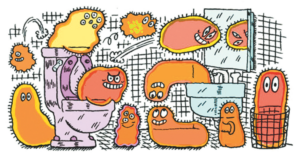By Sharon Miller Cindrich
According to the Center for Disease Control (CDC), washing your hands is the number one way to avoid becoming sick. While bathrooms, specifically public bathrooms, are often considered one of the primary breeding grounds for germs, restrooms are not the only places where germs hide.
Dr. Michele Bachhuber, clinical Advisor of ProActive Health for Marshfield Clinic in Wisconsin, says that germs aren’t actually hiding at all. In fact, they are out there in the open in all public places. “We need to be thinking about public places—places and surface that are used by the community,” says Bachhuber, who sites computer keyboards, elevator buttons and public phones as just a few of the places where germs are spread in the work place. “The public doesn’t generally think about elevator buttons, escalator handles or subway or bus poles are as places to be aware of,” says Bachhuber, adding that an estimated one in three people does not wash their hands after using the restroom, then contaminating everything they touch throughout the day.
According to The Soap and Detergent Association’s (SDA) 2008 Clean Hands Report Card SM, Americans are stagnant when it comes to hand hygiene, which might surprise some folks. “We often forget about cleaning up after touching surfaces we come into contact with every day: countertops, doorknobs and phones, for example,” says Brian Sansoni, of the SDA, who adds that along with hand washing, sanitizing germ-prone areas can also reduce the spread of germs. “You should make it a habit to clean and disinfect surfaces on a regular basis.”
Even when they do wash up, Americans don’t do it often enough or long enough, according to the SDA’s report. Of the one third that did visit the sink after using the restroom, 54 percent of respondents didn’t wash their hands long enough to effectively remove germs and dislodge dirt. The CDC and the SDA recommends washing with soap for at least 20 seconds to be effective against germs.
How can you protect yourself from germs this season?
Check out the following germ-prone areas and situations where germs are especially present. Wash hands frequently when you come in contact with these surfaces.
In the workplace
Wash hands before and after staff meetings if food is served, and before and after any meal. Newspapers or magazines in the break room, a colleague’s computer keyboard, phone or the office fax are all germ prone areas. Avoid spreading and receiving germs by washing hands before and after any meet and greet activity in the office.
In the bathroom
Germs can be extra abundant in bathrooms, around toilets, tubs, and sinks. Toothbrushes, solutions and containers for contact lenses and dental appliances should be stored in closed containers, and towels and washcloths should be changed frequently.
In the kitchen
Kitchen counters and any surface that touches food can be a breeding ground for bacteria and germs. Handles on cupboards, microwaves, stoves and refrigerators should also be cleaned regularly. Trashcans should be lined with a plastic garbage bag and changed before overflowing.
At home in general
Hands should be cleaned before and after tending to any open wound, caring for a sick person, changing diapers, playing with pets, using video hand controls and television remotes.
Regularly sanitize phone receivers, door knobs, and personal computer keyboards. Regularly laundering articles of clothing that come in contact with your hands, mouth and nose, such as mittens, gloves and scarves can also reduce your contact with germs.
In the car
Steering wheels, stick and gear shifts, control buttons for the radio and heater and car keys can all carry germs. The gas pump handle and keypad on the pump can also harbor germs.
In public
Every public surface that a hand touches can hold germs. Be particularly aware of grocery cart handles, ATM buttons, elevator buttons, stair railings, door handles, sink handles and counter tops.





